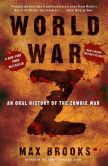 Run! The zombies are coming! Actually, they don't move all that quickly so maybe a brisk walk will do. They do tend to travel in packs though, and by God are they are persistent. So keep your wits about you, and get out of there! And if you must fight one of them, remember to aim for the head.
Run! The zombies are coming! Actually, they don't move all that quickly so maybe a brisk walk will do. They do tend to travel in packs though, and by God are they are persistent. So keep your wits about you, and get out of there! And if you must fight one of them, remember to aim for the head.The "Z" in World War Z is for zombies and as the subtitle indicates, it is an "an oral history of the zombie war" as told by its survivors. I don't recall how it started, but all of sudden the dead stop staying dead. At first, people don't believe what they're seeing. How could they? It is absurd, but it's happening and people have to respond in some way, whether it is hiding, fighting, running. This tells the story of how the world responded.
I have a friend who doesn't read or watch zombie anything. I get it, but as I told her, despite the title, the zombies don't really matter here. Told in the style of a documentary, the real story here is how people - as individuals, as nations, and as a species - react to a world wide crisis. To tell this story, the narrator interviews people from all over the world. The interview subjects include soldiers, government officials, and civilians. There are college students, religious clerics, and even an astronaut who watched the war unfold from space. All are ordinary people trying to survive in extraordinary circumstances. Some people try to save only themselves. Many band together and decide to fight together as best they can. A few figure there has to be a way to make a profit out of all this.
Like any good post apocalyptic story, it doubles as a commentary on the present world. One of things the zombie war makes clear for instance, is how unprepared and unskilled consumer culture has left at least some (or probably more accurately, most) of us. We are use to buying things and calling someone else to fix whatever is broken, assuming we don't simply throw away whatever isn't working and simply buy another. One of my favorite passage books is when the narrator notes the number of consultants, lawyers, and creative directors who survive in Los Angeles. The problem is that in a post-zombie world no one needs anyone to consult, negotiate a contract, or do whatever a creative director does. The world needs people who know how to farm, fix toilets, and build stuff. People with college degrees and big bank accounts complain about being denigrated when told of the manual labor they'll need to now adopt as their new career. People accustomed to wearing suits and giving orders now have to be taught how to survive by people who use to clean their houses and prepare their food. People sometimes find themselves having to make unspeakable decisions in order to survive. And amidst all the chaos and killing, they have to think about what kind of future they want to create, assuming there is a future.
More than anything, this book made me think about how I would survive a disaster, whether natural or man-made. Where would I go? How would I get there? What should I bring with me? What skills do I need to be prepared? Coincidentally, today at work I had to attend active shooter defense training (i.e., what to do if someone shows up on campus and starts shooting up the place). One of the points the instructor made was to think ahead and know your surroundings. Where are the exits in the building? Not just the main door that you enter in every day, but the less obvious ones. If you can't safely reach an exit, where would you hide? In other words, plan ahead. After reading this book, again I thought, what's my plan?
I really liked this book. I haven't read or watched many zombie related books or movies, so I'm not sure where this fits in the zombie canon. That being said, if you're into zombies the way teenage girls are into moody vampires, this book might not be for you as this book really isn't about the walking dead. It's about the living and what they're willing to do to stay that way.
No comments:
Post a Comment
I look forward to your comments. Tell me about the books you're reading.